Some weeks ago, I created a short survey and posted it on Instagram and in some Facebook groups themed around RPGs. The survey consisted in a number of questions about preferences in turn-based JRPGs. Here are the results.
I asked participants to answer questions in four categories:
- general questions,
- questions about story,
- questions about combat and
- questions about exploration.
After that, they had the chance to add anything to their answers in a free-text format.
After two weeks, 70 people had taken the survey. Let’s see what players of turn-based JRPGs think about various elements the genre is known for, shall we?
General Questions
First off, I wanted to get some general information before diving deeper into story, combat and exploration. I was curious about favourite games as well as favourite and least favourite elements regardless of categorisation.
These were the general questions and the results:
What’s your favourite JRPG of all time?
I dismissed answers that weren’t clear, like when a full series was mentioned. I also counted Persona 5 Royal as Persona 5. As far as ‘Final Fantasy VII’ is concerned, we can’t be sure whether or not everyone actually meant the original or if the term includes the remake as well, so keep that in mind. I simply left in the entries that were questionable regarding their genre.
- Baten Kaitos
- Breath of Fire
- Breath of Fire III
- Brigandine: the Legend of Forsena
- Chrono Trigger
- CrossCode
- Devil Survivor
- Dragon Quest VII
- Dragon Quest VIII x 2
- Dragon Quest XI x 2
- Earthbound x 2
- Final Fantasy I
- Final Fantasy IX x 4
- Final Fantasy V
- Final Fantasy VIII
- Final Fantasy VII x 4
- Final Fantasy VI x 3
- Final Fantasy XIV
- Final Fantasy X x 3
- Lufia II: Rise of the Sinistrals
- Miitopia
- Panzer Dragoon Saga
- Persona 5 x 2
- Secret of Mana
- Suikoden
- Suikoden 2 x 3
- Suikoden 5
- Tales of Symphonia
- Tales of Vesperia
- The Legend of Heroes: Trails in the Sky x 2
- Vagrant Story
- Wild Arms
- Xenogears x 3
- Ys VIII: Lacrimosa of DANA
I guess the winners are Final Fantasy VII and Final Fantasy IX, both rather controversial choices, as far as I can tell. I, personally, think Final Fantasy VII is overrated while I always thought only a few people liked Final Fantasy IX (which I do like very much, by the way).
What’s your favourite JRPG released in the past 12 Months?
It was clear that many people won’t bother looking up the exact release date of the games mentioned, so there will be a few entries which have been released prior to the 12-month time frame. I left them in, since apparently, they at least an impression. This, again, is a very long list, but I reckon you want to see it all. So here you go:
- Tales of Arise
- Arafell
- Atelier Sophie 2: The Alchemist of the Mysterious Dream
- Chrono Cross: The Radical Dreamers Edition
- Digimon Survive
- Elden Ring
- Etrian Odyssey 2 Untold: The Fafnir Knight
- Final Fantasy IV
- Final Fantasy VI Pixel Remaster
- Final Fantasy VII Remake x 2
- Final Fantasy VII Remake Intergrade
- Final Fantasy XV
- Live A Live x 2
- Persona 5
- Pokémon Diamond
- Pokémon Legends: Arceus x 2
- Shin Megami Tensei V x 5
- Soul Hackers 2 x 3
- Stranger of Paradise: Final Fantasy Origin x 2
- Tales of Arise x 10
- The Legend of Heroes: Kuro no Kiseki
- Triangle Strategy
- Voice of the Cards
- Xenoblade Chronicles
- Xenoblade Chronicles 3 x 11
- Xenosaga 3
- Yakuza: Like a Dragon x 2
- Ys: Monstrum Nox
The winner is Xenoblade Chronicles 3. Even though this was a survey explicitely about turn-based JRPGs, it’s not very surprising to me that many turn-based-JRPG fans would be interested in a major title like Xenoblade Chronicles 3 as well despite the real-time combat. I mean, it isn’t exactly an action RPG, is it, since you don’t necessarily need fast reaction times to enjoy the combat in this series and fare well in it.
Noteworthy: 9 people out of the 70 (12.8%) said they hadn’t played any JRPG in the last 12 months (or at least couldn’t remember doing so).
Can you think of anything you hate seeing in JRPGs?
I knew this would be a mess to assess, but I was very curious, because this kind of question can provide game designers with valuable insight. These were all the answers given, some slightly edited for clarity and/or commented on in square brackets:
- A clunky story line. You start off with simple tasks all the way to killing God with the power of friendship. That would have worked for me when I was 12 years old.
- Action RPGs
- An always-cheerful girl with a high-pitched voice
- Any kind of ‘dating’ system. It’s fine if it’s something like Persona, but usually, it annoys me.
- Anything American-related
- Back-up members not levelling up as fast as active members
- Bland/unlikable characters, especially if it is the protagonist
- Boring things that don’t really make any sense within the world
- Camera focussed on girls’ panties
- Censorship
- Changing the armor changing how your character looks [Not sure I understood this one correctly.]
- Complicated game mechanics
- Cooking mechanics
- Cooking systems for buffs. Slow text transitions. A slow walking speed.
- Counterproductive elements, for example, you can jum[p?] but get into combat more often
- Crafting
- Creepy sexual references to females
- DLC
- DLCs (especially day 1) that are supposed to be ‘story content’ but are just lazy and obvious cash grabs
- Excessive ‘look at my breasts’ animations, unskippable cutscenes
- Fan service and cryptic moments
- Fetch quests
- Fishing quests
- Front-loaded tutorials and redundant lines of dialogue
- Generic story and characters
- Grinding
- High difficulty curve that require tons of grinding
- When the game feels too long for no reason
- Hyper-intelligent children
- Lack of aesthetic changes for weapons and armor
- Lack of replayability
- Limited party customization and linear plot so there’s no replay value
- Linear dungeons; walls of text; nonsense random chat, e.g. ‘I see an item up ahead’, which gets mundane so fast
- Long dialogue and hefty tutorials and skins / clothing packs
- Lootboxes and gacha
- Loud obnoxious characters
- Main characters being controlled by the computer
- Maybe boring sidequests or fetch quests
- Micro DCL or season pass, or paid boost leveling
- Teens not trained at all defeating God, and ‘waifus’
- Not enough sequels/remasters/remakes
- Overly lengthy cutscenes
- Poor plot or boring gameplay
- Predictable plot
- Real-time combat. Turn-based is a forgotten art.
- Shitty endings. You play for 50 hours to have everyone die at the end? And sometimes, it’s just nice to have the bad guy be a bad guy. You don’t always need to feel empathy for them.
- Silent protagonists. Human bosses that have tons of HP for no good reason. Bosses that have cutscenes showing how strong they are even after you destroy them in battle. Mashy battle systems. Anime nonsense.
- Straight action RPGs
- Tedious minigames
- The switch to action-oriented RPGs instead of turn-based
- Too much backtracking
- Too much dialogue and not enough action
- Too much exposition, slow/uninteresting combat
- Too many fetch quests, terrible voice acting
- Too much linearity, overloading sidequests that do not change the main storyline
- Too much railroading (let us take a break from the main story periodically)
- Unskippable cutscenes
- Weird battle mechanics
- What I hate seeing in some JRPGs are unclear story, or overdetailed story and mechanics.
Can you think of anything you would love to see more often in JRPGs?
Here are all the things people love in JRPGs. Take note, developers!
- A compelling plot
- Advanced job systems, more international themes and characters
- A great focus on strategy
- Alternative leveling paths, I don’t always want to only kill things all day.
- A solid story line and realistic conversation lines. I find that a lot of JRPGs (japanese games) would have absurd lines just for the sake of making a character look cool.
- Character customization and job classes.
- Depends on the game
- Dynamic battle gameplay
- Fan service
- Fishing minigames, preferably something like the one in Dark Cloud 2
- Fluidity of combat
- Freedom of choice
- Fully customizable party and/or branching narrative. Also shorter games.
- Fun-to-use abilities
- Hot people
- I love JRPGs for their story. An EXP share in general would help avoid low character development and problems potentially faced late game where stories remove characters from your available party.
- Immersive characters, the option to reset skill trees like in DQ 11, and every JRPG should have the Xenoblade teleport system or the Dragon Quest zoom systems.
- In-dungeon puzzles similar to the Wild Arms series
- I would love to see JRPGs with a good exposition of the story and probably a new battle system if it is a tactical one.
- Large pools of characters and an upgradable HQ
- Many class choices, depth of abilities instead of generic upgrades
- Minigames
- Modern-day setting
- More character development. Many JRPGs don’t have any.
- More depth in terms of skills, much more to do
- More emphasis on lore and world building
- More exploration
- More freedom in classes
- More horror style
- More magic animations
- More mature stories
- More of the simpler turn-based battle systems, like Dragon Quest or older Wild Arms
- More simplicity
- More things to level up, like skills or things like that
- More thoughtful side quests that tie into the main story
- Multi-group battles vs. big enemies
- Narrative-driven side stories
- New Game Plus or postgame or secret boss after the ending
- New Game Plus with multiple endings
- New games over remasters
- Non-traditional battle systems, like Valkyrie Profile or Radiant Historia
- Option for EXP that adjusts to your level relative to the story progression, to avoid grinding if wanted and to be more easily able to create fights that have a fair and fun challenge
- Postgame and dating
- Reasons to believe the characters can become as strong as they usually do
- Ressource system other than MP for skills/spells (see for example Secret of Evermore), exciting endgame grind (see for example grottos in Dragon Quest IX)
- Rewarding exploration. Some games allow a certain amount of freedom to seek items or quests, while some others are either very rigid, or allow freedom of movement only to move from Point A to B anyway with little to no rewards to find.
- RNG mega dungeons
- Semi-open world (based on storyline), crafting weapons from items found in battles
- Story
- Story branching depending on choices
- Strong story and fantasy worlds, not like FFXV
- Tons of customization and replayability
- Town/city-building minigame
- Turn-based
- Turn based. Like the old days.
- Turn-based battle
- Turn-based combat
- Turn-based combat. Small parties.
- Turn-based combat
- Unique mechanics
- Unique storylines
- Unique turn-based combat mechanics, like the press turn system
- Voice acting similar to FFXII
Questions about Story
Next, I wanted to learn more about player preferences in terms of story. JRPGs are known for their extensive storylines and their well-rounded characters. But is this actually a focus for players? After all, JRPGs are games, so gameplay should be very important as well, shouldn’t it?
Well, let’s have a look at the stats.
How important is the Story compared to the Gameplay in a JRPG?
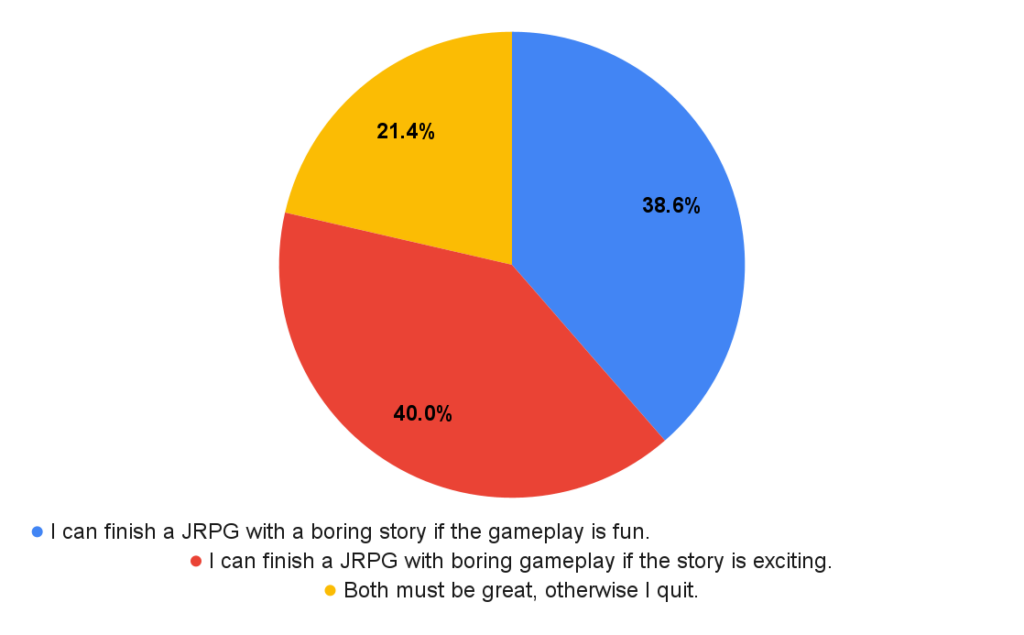
The results are very balanced, I’d say. Some people have a strong focus on gameplay, some need a compelling story. It seems that you could get away with a gameplay-first approach in this genre as well!
1 out of 5 players said that both must be great for them to keep engaged, which puts a lot of pressure on developers.
Do you prefer a pre-written Story with pre-written Characters or a Story that changes dramatically depending on your Choices?

Many games advertise themselves as being full of branching story archs. Most players, however, seem to be content with a moderate amount of story-changing choices. Only 1 out of 10 said they would like to see ‘lots’ of story-changing choices. Which makes sense: Considering all the games you can play today, you probably won’t replay games very often. Thus, two or three different story branches should, in most cases, suffice.
It’s worth pointing out that 30% of players don’t need story branches at all. They want to experience the story the game has to offer — as if it were a film.
Do you like silent Protagonists in JRPGs?

I decided to keep the diagram simple, but that means I need to tell you here in the text: 4.3% of people don’t play games with a silent protagonist (the green chunk).
The rest of the results are as expected, I’d say. Some actually like silent protagonists (probably because it lets them fill in the blanks with their own ideas), most don’t mind, some don’t really like it, but still play the game.
Since there are more people who don’t like silent protagonists than people who actually prefer one, developers should really make up their minds: How important is it for the experience to keep the protagonist silent? That said, JRPGs are probably a genre that benefits from a protagonist who talks anyway, as opposed to, say, The Legend of Zelda or Pokémon (which arguably isn’t your standard story-driven JRPG).
How long should the Main Story of a JRPG take?
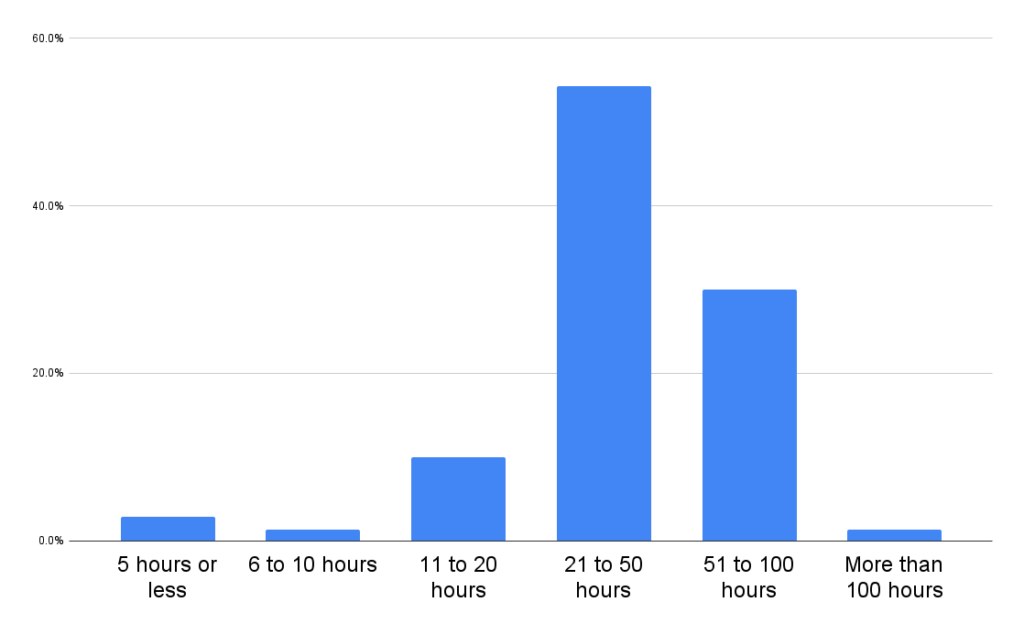
Once again, the diagram would have become a bit messy with the values shown, so I shall just tell (not show) you that …
- 2.9% would like to play for 5 hours or less,
- 1.4% for 6 to 10 hours,
- 10.0% for 11 to 20 hours,
- 54.3% for 21 to 50 hours,
- 30.0% for 51 to 100 hours and
- 1.4% for more than 100 hours.
21 to 50 hours seems to be the sweet spot for an enjoyable JRPG experience. There are many games of the genre that offer content for more than 100 hours, but actually, only a tiny minority of players want that.
(On this note, could anyone please explain to me why publishers even release such long games? Wouldn’t it be better to tell their studios/devs to make shorter games, so players will finish them faster and buy the next one? For example, why doesn’t Nintendo tell Monolith Soft to make the next Xenoblade Chronicles 50 hours long at max, so players would have the time to play more Nintendo titles afterwards? Additionally, Monolith could be working on the next instalment way earlier. Comment below!)
Questions about Combat
The largest part of JRPG gameplay consists, arguably, in combat mechanics. With story having been discussed, let’s turn to combat.
What do people think about turn-based battles in JRPGs, how should the battle system be constructed?
How many Player Characters should be visible at a Time in turn-based Combat?
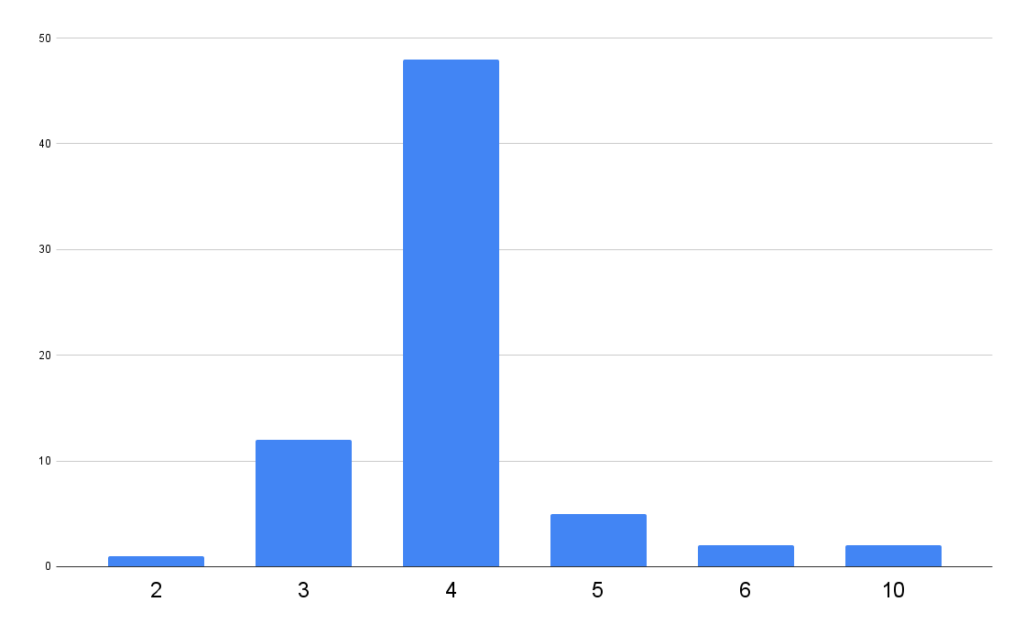
Most players prefer 4 playable characters in turn-based JRPG combat — which is, I think, also the norm. I am a little surprised by the low number of people who would like to see 3 characters, since that number seems to be very common in games as well. For example, Chrono Trigger, an extremely popular game, had 3 characters.
For your Standard Encounters, do you prefer fewer Battles that are long and strategic or more Battles that are short and straight-forward?

Less is more: Two thirds of players would like to see fewer encounters with more strategic thinking. The question to ask next should be, of course, about the extent of strategic thinking. Should there only be some thinking involved, like in Battle Chasers or the Shin Megami Tensei series, or quite a lot of it, like in Chess or TCGs?
There is, on the other hand, a rather surprising number of players who actually seem to like button-mashing battles — and maybe even grinding.
In my opinion, a balance can be found in easy common encounters plus difficult bosses. But we’ll get to that later.
Do you prefer smaller or larger Values for Character HP?

You may have been surpised seeing a question like this, but I, personally, am a bit torn when it comes to HP and damage values. In Game Master Plus, I kept numbers small, but in LV99: Final Fortress, the setting required larger numbers (and maybe I should have made them even larger). Therefore, I wanted to take this opportunity to ask for player preferences.
The results are similar to the results regarding party size: Most people think 4 is the sweet spot, some prefer 3, a few prefer 5. Only 2.9% of people would like to see 2-digit HP values, 1.4% would like to see 6 or more digits. Your standard bell curve, pretty much.
I am a little surprised about 3 not being more popular, since in my estimation, most JRPGs of the ‘golden era’ of 16-bit consoles had 999/999 as the max value. Maybe a question about the participant’s age would have been interesting, so we could have checked whether or not older players tend to prefer 3 digits. Oh well. Next time.
Do you prefer smaller or larger Values for Damage Numbers?
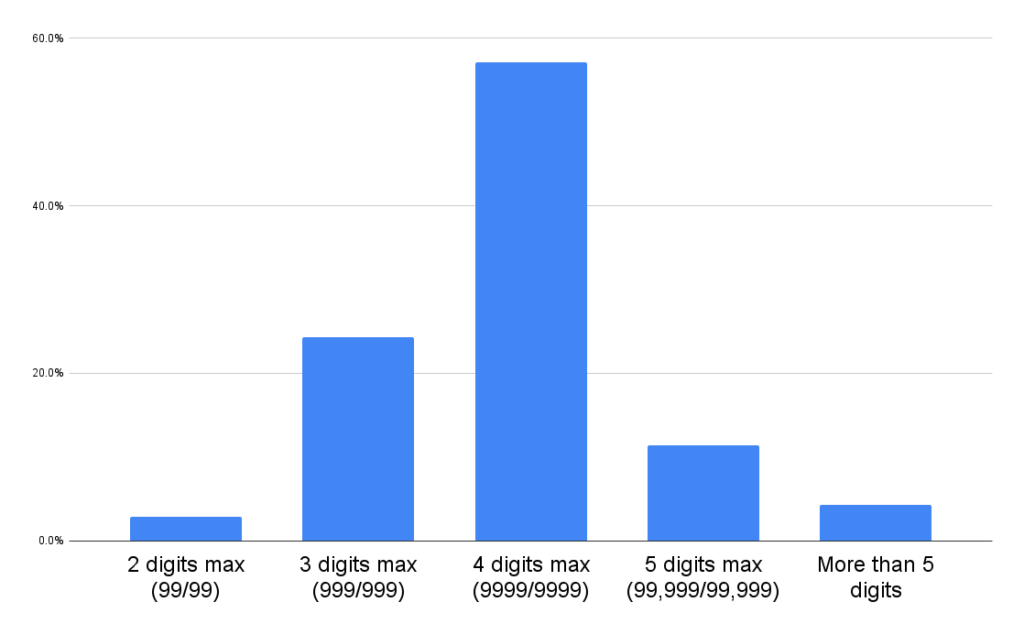
This question yielded – expectedly? – quite similar results to the HP question. 2.9% of people would like to see 2-digit values once again.
Many years ago, I read somewhere that human perceive 4 objects as 4 objects, while everything more than that is perceived as ‘3 plus 2’, ‘3 plus 3’, ‘4 plus 3’, ‘4 plus 4’ and so on. It’s called Subitising. In other words, humans can only perceive 4 objects at a glance and need to count everything else to some extent. This may explain the preference for 4-digit values: They are large — which is cool, I guess, since it, later in the game, signifies progression very clearly —, but still easy to keep track of.
How many Skills (Techs and/or Spells) should each player character have available at the end of the game?

Admittedly, this question wasn’t easy to answer. Most people probably don’t have a good grasp on the number of skills characters may have learnt over the course of a 50-hour game without actually counting them. Still, I was interested in a general direction here.
To my surprise, only 1.4% of players like to have 5 or fewer options, while the very popular Pokémon franchise has only allowed for 4 skills in the main-line games ever since gen 1. I would have thought that a limited number of interesting and versatile skills would be compelling, similar to how Chess has only a few rules, but can become extremely complex nonetheless (due to Emergence).
The survey shows, however, that 6 to 10 skills seems to be the way to go, while it probably can’t hurt to add up to 10 more.
Do you prefer fewer Bosses with complex Battles or more Bosses with simple Battles? We’re not talking Difficulty, but Duration and Variety within a Battle.

Here’s the boss question I alluded to earlier. So, how many bosses do you need in your JRPG? It turns out you don’t need that many. Most people would like to see 6 to 10 bosses which are well-thought-through. Only 5.7% or participants said they would like to see more than 20 bosses. It’s that easy.
Well, not really. Unfortunately, while you may get away with just 6 to 10 bosses, I reckon many people would like to see more if they were actually just as complex in their encounter designs. Again, I wanted to see the general direction and not overwhelm participants with too many questions. Thus, we would definitely need to dive deeper into the topic to actually decide on the ‘right’ number of bosses.
But seeing the results as an indication, I think it’s safe to say that people tend to prefer quality over quantity when it comes to boss encounters.
Questions about Exploration
A third aspect prominently present in JRPGs is exploration. Whether it’s a vast, open world or a series of locations with more linear passageways, most games encourage you to take your time and have a close look at your surroundings.
But what kind of exploration do players actually enjoy?
Do you prefer Open-World Games or Games with a more linear Approach?
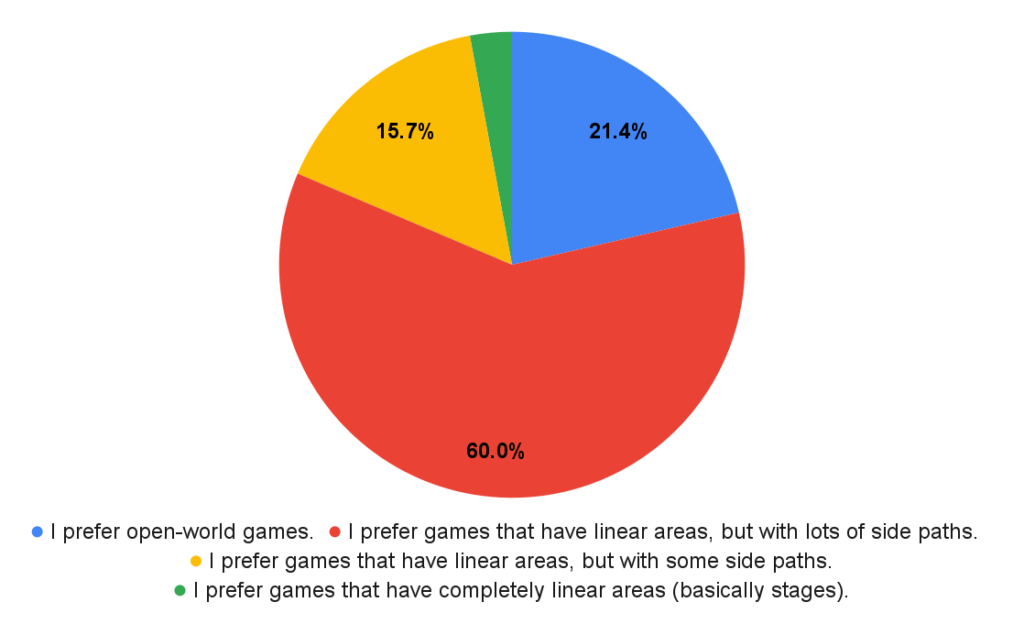
Open-world games seem to be in vogue at the moment. Most people who participated in the survey, however, do prefer somewhat linear areas. It seems that players would like to know where to go, but still have the option to explore optional paths. While games like Breath of the Wild are very compelling in that they let you wander around and find tons of side content to keep you busy for hours, a clear goal seems preferrable to JRPG players.
Only 2.9% like games with completely linear areas and no branching paths to explore.
How many different Items do you collect in an ideal JRPG?

Players do like finding items, in general. Collecting stuff seems to be fun to 35.7%, so much so that they prefer it if games basically drown them in arbitrary materials, like Xenoblade Chronicles tends to do. Most people, however, do like to find a variety of items, but not as many as in XBC.
Every fifth player prefers a minimal approach. Like Secret of Mana, their ideal game features only a small set of items that all have a clear purpose.
There had been the option ‘I prefer having no items at all’, but no participant chose it.
Do you like examining Objects (like Plants, Barrels or Furniture)?
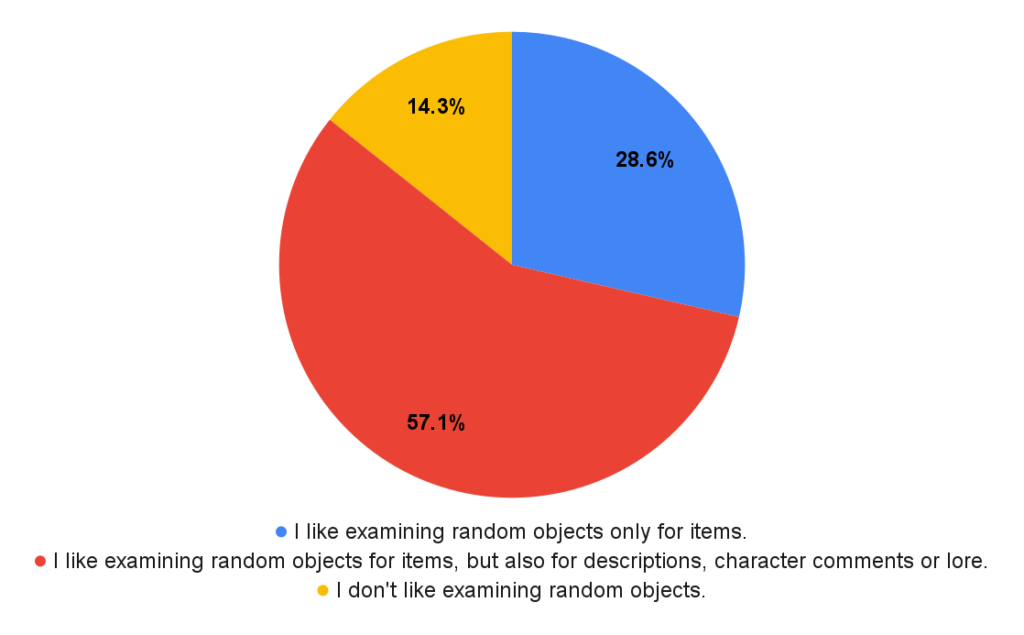
Most people actually like examining random objects for various reasons: items, descriptions, character comments and/or lore. But almost every third player prefers to find items that way instead of ‘just’ some text.
14.3% of people don’t like examining objects at all. I would have expected this number to be higher, to be honest.
In Wildsilver, there are currently no hidden items (as there were in Game Master Plus) and also very little descriptions, character comments or lore to find by examining things. Seeing these results, I may think about adding some objects that can be examined for items — even though the player gets quite a few items already. Yeah, it’s tricky.
This question actually ties in with the previous one in a way: Could you imagine Secret of Mana with hidden items in barrels? With an abundance of materials, on the other hand, there is absolutely no problem in having objects contain items from time to time. That way, the item concept seems to dictate the object concept to some extent.
Do you talk to random NPCs?
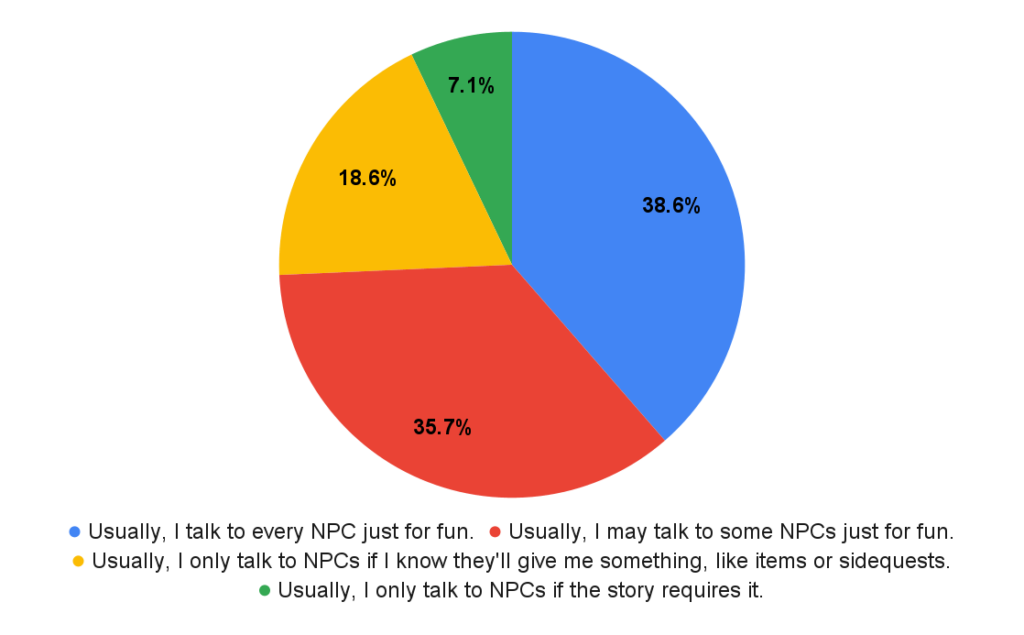
I was a little surprised that the first option received the most agreement. I didn’t think that many players would take the time to talk to every single NPC in a game. It’s great to know for devs, though, that the work they put into NPC dialogue clearly isn’t wasted.
18.6% talk to NPCs that suspectedly give players more than a few lines of text. 7.1% only talk to NPCs who seem story-relevant. I think this is actually an reasonable way of playing, seeing that — as I said — players have access to so many great (and, in this genre, quite lengthy) games nowadays.
Final Question
At the end of the survey, I gave participants the chance to write down some additional thoughts.
Is there anything you would like to add?
These were the answers (again, edited and/or commented on):
- A fitting soundtrack for the world we play in would be cool.
- Great survey [Thank you! 😄]
- I, personally, believe JRPGs would benefit from being shorter games, in terms of main story. Many of them get too bloated, in my opinion.
- Engaging optional side quests/stories. Customisable skill/spell system. Different Japanese anime styles.
- Thanks [Thank you too!]
- Some answers don’t reflect too well what I would reply normally.
- After a long day at work, I like a game I can tune out with for a bit and enjoy. Turn-based, where grinding can be fun. Auto battles are a good option too.
- The only ‘action’ RPG I liked recently was Dragon Quest Builders, I’m not at all interested in more recent titles that are leaning more heavily into the Fighting and 3D arena direction. I like games that I can take my time with, pause and put down in case I need to tend to IRL matters. I will probably never play the FF7 Remake because I don’t like the combat change, even with the hybrid turn-based system.
- Maybe a list of other JRPGs or RPGs [Not sure what this means]
- They need to revive the Breath of Fire series with pieces of old games and updated graphics, not as an app on your phone.
- Have a great day! [Thanks! You too!]
- Thanks
- No, great survey
- Turn-based JPRGs have followed the same basic mechanics for a long time. Some innovation would be nice.
- I’m a busy person who doesn’t have a lot of time to spend on a single game, so I prefer shorter game sessions and shorter overall game time so I can enjoy the game for a bit, then move on to something else. I’m more inclined to give a game multiple playthroughs if it gives me a reason to replay. [Totally agree!]
- This was fun to take
- Change is good.
- I answered all the questions … do I get an item now? 😉 [‘Obtained 📜Survey Results!’]
- Need to make some questions multiple options. I like 3 or 4 characters per battle but it won’t let me add a ‘–’. [I see your point. Sometimes it may be better to force participants to decide, though.]
- Overworld RPGs with turn-based battle and lots of map exploration is still #1 for me. Hoping for this kind of game again on the modern consoles.
- I dislike everything made by Falcom. So I like games that are different from Falcom games.
- I would love a large roster with characters having their own unique skills/spells. Forcing the user to utilize them all over the course of the game to get a feel for them. Final Fantasy 6 did a nice job of this.
- Quality characters are nice.
***
And that concludes this article. Tell me: Did you find the results interesting? Was there anything that really surprised you? What questions would you like to have answered in the next survey?
